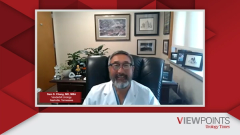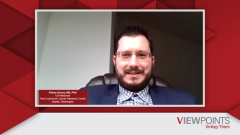
High-Risk Non-Muscle Invasive Bladder Cancer: Frontline Therapy
First-line treatment options available for patients with high-risk non-muscle invasive bladder cancer and variables that affect treatment decisions.
Episodes in this series

Leonard G. Gomella, MD: We’re going to talk now about non-muscle invasive bladder cancer and we’re going to ask Karim to comment a little bit about the factors that you consider with particularly the patient with high-risk non-muscle invasive bladder cancer. What are the factors that you look at when you’re considering how you’re going to be treating this patient?
Karim Chamie, MD: Thank you. So obviously patients with high-risk non-muscle invasive bladder cancer, those are patients that have high-grade T1 or CIS [carcinoma in situ], or patients that have had multiple recurrences of high-grade disease. The things that I account for as far as offering treatment options would be tumor grade, BCG [Bacillus Calmette-Guerin] responsiveness, time to recurrences from BCG, multi-focality—sometimes you can pick up variant histology. Those are all factors that kind of play a role. As far as subsequent treatment options, it’s based on that. So if a patient has high-grade T1 or a multi-focal CIS those are the patients that I’m going to give them BCG and I’m going to give them BCG for 3 years based on the SWOG protocol of induction and maintenance. Those are the patients that I’m going to try to prioritize as far as trying to get them a full dose of BCG as possible. If sometimes patients may not have access to BCG or our clinics may not have access to BCG, we try to get them onto a clinical trial that does.
For instance, we have the N-803 study where patients are offered BCG for BCG naïve patients, either BCG plus N-803 versus BCG alone. There’s the CheckMate 7G8 study of nivolumab [Opdivo] plus BCG versus BCG alone. There’s the [Keynote-]676 study of pembro [pembrolizumab (Keytruda)] plus BCG versus BCG alone. There are multiple other studies including Pfizer’s anti-PD-1 [programmed cell death protein 1] plus their IDL [intermediate density lipoprotein] inhibitor. There are a number of other drugs that are actually being rolled out in this disease space. This is a wonderful opportunity for patients to get a full dose of BCG if they’re interested in getting cutting edge clinical trials.
As far as BCG unresponsive, there are a number of clinical trials in this disease space. Most have tried and failed. Merck’s pembrolizumab study gained FDA [Food and Drug Administration] approval based on the Keynote-057 study whereby we found 41% of the patients had a complete response at 3 months and if you follow these patients at a year, half of those that had a complete response maintain that complete response. We find that if they go 6 to 9 months without a recurrence, they tend to maintain that. We found that similar in our IL15 N-803 study. Obviously, the CheckMate 057 study was published in Lancet Oncology a couple of years ago. Bristol Myers [Squibb] is also looking at the CheckMate 9UT study in this disease space as well. Urologists are going to end up offering patients with BCG unresponsive bladder cancers probably one of these drugs if patients are unwilling or unfit to undergo a radical cystectomy or are unwilling to undergo radiation therapy. In addition to maybe intravesical chemotherapy, such as gemcitabine [Gemzar], docetaxel, or a combination, it’s clinical trials.
Leonard G. Gomella, MD: I think you make a good point and certainly everybody in this audience knows we really have a problem with BCG shortages. It looked like it was getting better and then it was getting worse sort of like the pandemic. Things were improving with BCG and now we’re back to shortages, particularly here on the east coast. So having these alternative opportunities for patients to get on clinical trials that may include a component of BCG is certainly important. We have things like Adstiladrin [nadofaragene firadenovec] that’s currently working its way through the approval process. It’s amazing that when BCG was approved way back in 1990, 1991, that was it. That was the go-to drug and now we’re very fortunate that we have a large number of other agents including the different chemotherapies that you’ve talked about. Again, we’re really focusing now on the PD-1 and PD-L1 [programmed death-ligand 1] inhibitors in the management of bladder cancer again for non-muscle invasive disease.
Transcript edited for clarity.
Newsletter
Stay current with the latest urology news and practice-changing insights — sign up now for the essential updates every urologist needs.







